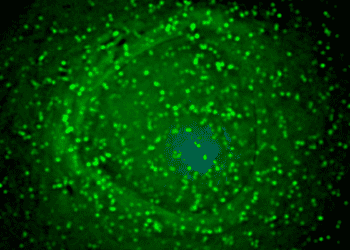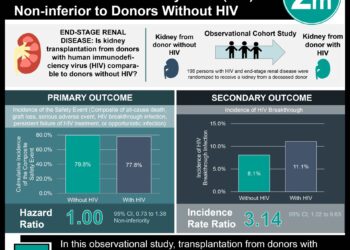Genetic variant linked to poor patient survival following lung transplantation
Image: PD
1. A specific TT-genotype variant that encodes the immunoglobulin gamma (IgG) receptor was associated with increased patient mortality post lung transplantation.
2. Patient risk of respiratory infections after lung transplantation was greater in patients with the TT-genotype.
Evidence Rating Level: 2 (Good)
Study Rundown: Lung transplant patients often suffer from post-surgery organ rejection leading to the need for a second transplant and decreased patient survival. While the cause of such rejection is not yet fully understood, it is believed to be an inflammatory immune response. Surprisingly, recent research (linked below) has shown that the broad immunosuppressive therapies widely used today may actually increase the likelihood of rejection. Accordingly, more investigations into the nature of the immune system and its role in post-transplant survival are needed.
This current study explored links between genetic variations in the IgG antibody receptor gene (FCGR2A) and patient survival after lung transplant. The examined variants (CC-, CT-, and TT-genotype) included a single nucleotide polymorphism (SNP) previously linked to diseases with immunological pathways believed to contribute to transplant rejection. While no link was established between the genetic variants in the IgG receptor gene and chronic organ rejection, patient mortality and post-surgery infection were affected. When compared to the more common CC-genotype, the TT-genotype was associated with a decreased patient survival. Patients with this same genotype were also more likely to suffer from respiratory infections post-surgery. This study was limited by its retrospective nature and incomplete patient characteristics data, including pre- and post-operative IgG levels.
Click to read the study in the American Journal of Transplantation
Relevant Reading: Central memory CD8+ T lymphocytes mediate lung allograft acceptance
In-Depth [retrospective cohort]: This study examined genetic variations of the IgG-receptor-encoding gene FCGR2A in 418 patients. All patients had undergone lung transplantation surgery between 1991 and 2010 in a single hospital, with follow up continuing until 2012. DNA was harvested from patient blood or lung tissue at the time of surgery and subsequently genotyped. The majority of patients (52%) carried the CC-genotype, while 33% and 15% carried the CT- and TT-genotype, respectively. The TT-genotype was enhanced in lung transplants as compared to the normal population (15% versus 4%). One-way analysis of variance (ANOVA) was used to compare continuous variables while Pearson’s chi-squared test was applied to compare categorical variables. Survival events were estimated using the Kaplan-Meier method, with significance determined by the log-rank test. Multivariate analysis, used to calculate hazard ratios (HRs), accounted for patient characteristics, time and date of surgery, acute rejection or lymphocytic bronchiolitis events, and the use of the antibiotic azithromycin.
After multivariate analysis, the TT-genotype was found to carry twice the risk of mortality compared to the CC-genotype (HR= 2.26, 95% CI: 1.47-3.47, p = 0.0002). No significant difference was found between the three genotypes when comparing patient risk of chronic rejection after transplant. Though this study was unable to link respiratory infections and mortality, it was shown that patients with the TT-genotype were at an increased risk of contracting a respiratory infection and of having a greater number of infections following surgery than patients with the CC-genotype (p = 0.037 and 0.02, respectively).
More from this author: Genetic variations may predict outcomes for colorectal cancer patients, Neuroendocrine tumor marker pancreastatin may be predictive of survival, Initial kidney transplant factors may provide insight into retransplant success
©2012-2014 2minutemedicine.com. All rights reserved. No works may be reproduced without expressed written consent from 2minutemedicine.com. Disclaimer: We present factual information directly from peer reviewed medical journals. No post should be construed as medical advice and is not intended as such by the authors, editors, staff or by 2minutemedicine.com. PLEASE SEE A HEALTHCARE PROVIDER IN YOUR AREA IF YOU SEEK MEDICAL ADVICE OF ANY SORT.







